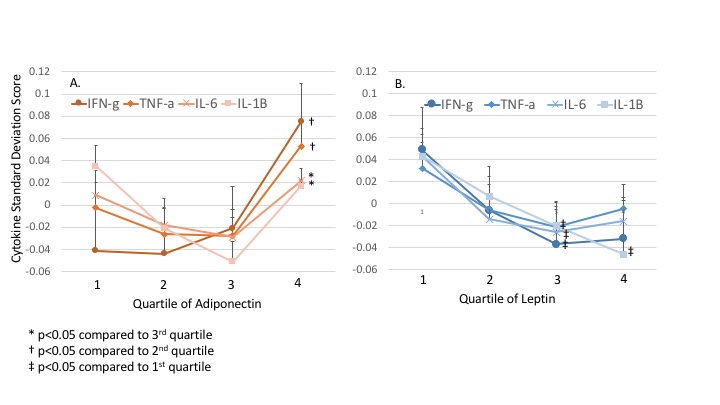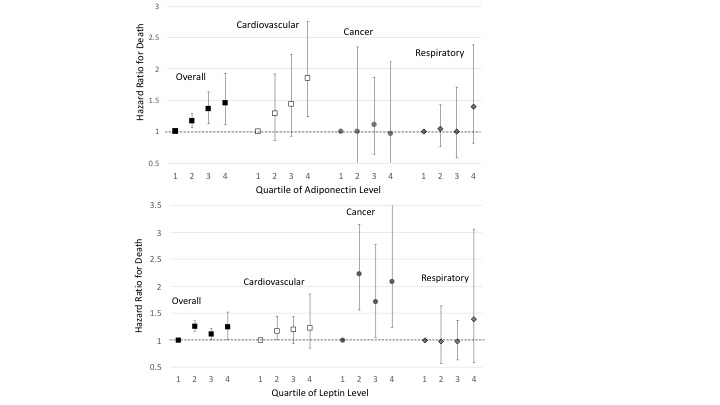Session Information
Session Type: Poster Session D
Session Time: 8:30AM-10:30AM
Background/Purpose: Adipokines are metabolic regulators and are associated with adverse outcomes in chronic conditions and among older adults. Elevations in one adipokine, adiponectin, have been associated with radiographic progression in rheumatoid arthritis (RA), suggesting an association with disease severity. We hypothesized that chronic inflammation leads to metabolic dysregulation and elevations in adipokines, which might serve as important biomarkers and predict adverse outcomes. We assessed whether adiponectin and leptin were associated with higher overall and cause-specific mortality in RA independent of other known risk factors.
Methods: Participants were adults with physician-confirmed RA, enrolled in a Veteran’s Affairs study, enrolled between 2003 and 2018. Adipokines and inflammatory cytokines (IFN-g, TNF, IL-6, IL-1b) were measured as part of a multi-analyte panel on banked serum from enrollment and were log-adjusted and standardized (per 1 SD). Dates of death and causes of death were derived from the Corporate Data Warehouse and the National Death Index. Covariates were derived from medical record databases, biorepository data, and registry databases. Levels of inflammatory cytokines were assessed over adipokine quartiles. Multivariable Cox proportional hazard models evaluated associations between clinical factors and all-cause and cause-specific mortality adjusting for demographics, comoribidity, and RA disease characteristics, including RA disease activity, at enrollment.
Results: A total of 2583 participants were included in this analysis with mean (SD) age of 71.9 (10.3). There were 960 deaths among 19,178 person-years of follow-up. The most common causes of death were cardiovascular (N=215), cancer (N=154), and respiratory (N=118). Higher adiponectin levels at enrollment were associated with older age, male sex, white race, lower BMI, higher rates of seropositivity, higher rates of radiographic damage, longer disease duration, use of prednisone, and higher rates of osteoporosis. High levels of adiponectin were also associated with higher levels of circulating inflammatory cytokines (Figure 1) but not with higher clinical disease activity (not shown). Leptin was primarily associated with greater BMI and obesity-related comorbidity as well as lower levels of inflammatory cytokines (particularly IL-1b). The highest quartile of adiponectin was independently associated with higher all-cause mortality [HR: 1.46 1.11, 1.93) p=0.009] which was largely driven by cardiovascular mortality [HR: 1.85 (1.24, 2.75) p=0.003] (Figure 2). Higher leptin levels were also independently associated with greater overall and cancer mortality.
Conclusion: Elevations in adipokine levels are associated with age, BMI, comorbidity, and seropositive and erosive RA and are independently predictive of early mortality. These observations suggest that adipokines may serve to identify patients with adverse metabolic profiles and may serve as important predictors of long-term risks. Associations noted between adiponectin and inflammatory cytokines support the hypothesis that chronic subclinical inflammation and metabolic changes, including elevations in adipokines, are interrelated.
 Figure 1: Line plots showing inflammatory cytokine levels by A) adiponectin quartile, and B) leptin quartile.
Figure 1: Line plots showing inflammatory cytokine levels by A) adiponectin quartile, and B) leptin quartile.
 Figure 2: All-cause and cause-specific mortality in adjusted models by A) adiponectin quartile, and B) leptin quartile.
Figure 2: All-cause and cause-specific mortality in adjusted models by A) adiponectin quartile, and B) leptin quartile.
To cite this abstract in AMA style:
Baker J, England B, George M, Wysham K, Kerr G, Reimold A, Monach P, Kunkel G, Sauer B, Hamilton B, Hunter C, Duryee M, Thiele G, Mikuls T. Elevations in Adipocytokines and Mortality in Rheumatoid Arthritis [abstract]. Arthritis Rheumatol. 2021; 73 (suppl 9). https://acrabstracts.org/abstract/elevations-in-adipocytokines-and-mortality-in-rheumatoid-arthritis/. Accessed .« Back to ACR Convergence 2021
ACR Meeting Abstracts - https://acrabstracts.org/abstract/elevations-in-adipocytokines-and-mortality-in-rheumatoid-arthritis/
